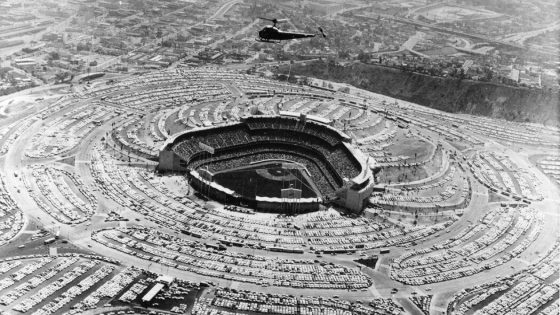A bill introduced in the California Legislature on Friday will seek reparations for the families of people who were displaced from their homes in Los Angeles in the 1950s on land that eventually became the site of Dodger Stadium.
The bill, introduced by Assemblywoman Wendy Carrillo, Democrat of Los Angeles, came after years of calls from organizers who have asked for reparations, either through money or the return of land that they contend was taken from their families.
The land, nestled between the San Gabriel Mountains and downtown Los Angeles, is widely known today as Chavez Ravine. But more than 60 years ago, the roughly 300-acre expanse was the three communities of Palo Verde, La Loma and Bishop, where about 1,800 families, most of whom were Mexican American, lived, according to the bill.
The residents of those communities were displaced in the 1950s by the city of Los Angeles, which had said that the land was needed to build affordable housing, according to the bill. The housing project was never built, and eventually the land was acquired by the Dodgers after they moved to Los Angeles from Brooklyn in the late 1950s.
“What happened to the families at those three communities, which are now known as Chavez Ravine, was unjust,” Ms. Carrillo said in an interview on Monday. “The promise of housing was never fulfilled, and those families were also robbed of homeownership and generational wealth because their homes were taken away.”
The bill is one of many that have been recently introduced in California that seek reparations for marginalized communities. If passed, the bill, the Chavez Ravine Accountability Act, would call on the city of Los Angeles to form a nine-member task force to provide compensation to the displaced or their descendants. The measure proposes different forms of compensation, including an offer of city-owned land or fair-market-value compensation.
A spokeswoman for the Los Angeles mayor, the Democrat Karen Bass, did not immediately respond to a request for comment on Monday.
The bill also calls for the construction of a permanent memorial in the area to honor those displaced and for a searchable database that details the history of the land acquisition. The database, Ms. Carrillo said, would be essential to verify which families were displaced.
At a news conference in Los Angeles on Friday, Ricardo Lara, who is the state insurance commissioner and a sponsor of the bill, said that the residents of Palo Verde, La Loma and Bishop were never adequately compensated for their homes and land.
“Many resisted but eventually all were forced to relocate,” Mr. Lara said. “We believe this legislation will provide not only overdue compensation for the residents of these three vibrant communities, but it will also provide a vehicle for reconciliation and healing.”
Among those who resisted leaving was Aurora Vargas, who went by Lola and who was photographed being carried out of her home by sheriff’s deputies in May 1959.
After learning about the episode, Ms. Vargas’s niece, Melissa Arechiga, 48, founded Buried Under the Blue, a nonprofit that has sought to raise awareness about the history of the displacement of area residents. Ms. Arechiga created the organization in 2018 with Vincent Montalvo, 46, whose grandparents lived in Palo Verde before they were also displaced.
On a video call on Monday, Ms. Arechiga and Mr. Montalvo expressed a mix of emotions — including gratitude and relief — about the legislation.
“You never think these things are going to come,” Mr. Montalvo said. “This wasn’t something of a fairy tale, but now we’re going to be able to dive in deep with the bill as written of getting a lot of the history out.”
Still, Ms. Arechiga and Mr. Montalvo said they wanted to see some changes to the bill, such as the Dodgers having to play a role in the reparations. As written, the bill does not involve the Dodgers and Dodger Stadium.
“Some of this has to come from the Dodgers, too,” Mr. Montalvo said. “Because they’re still benefiting from the land, and they’re still profiting off our lands.”
A spokesman for the Dodgers did not immediately respond to a request for comment about the bill on Monday.
Ms. Arechiga and Mr. Montalvo said they were aware that the bill’s introduction was the first of many steps before it could be passed.
An exact time line for the bill was unclear, but Ms. Carrillo that it would be considered by the California Assembly’s Judiciary Committee. The legislation would need to move through the Assembly and the State Senate before landing on the desk of Gov. Gavin Newsom, a Democrat, by September, Ms. Carrillo said.
As written, the bill would require the database of former residents to be ready by Jan. 1, 2027, and the database would be needed before any compensation process could begin.
“It’s not over, but it makes it a little bit more real,” Ms. Arechiga said. “It verifies that all the hard work wasn’t for nothing.”
Source Agencies



